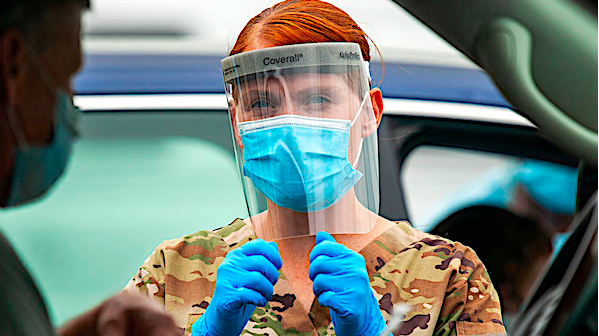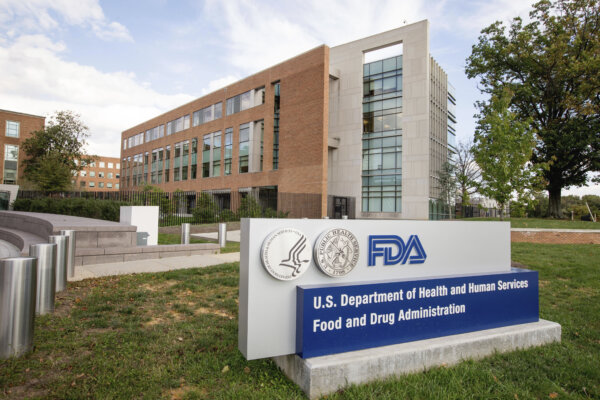‘We would have people in isolation for a very long time if we were relying on PCRs’
Delaware Army National Guard Pfc. Kelly Buterbaugh gives instructions to a motorist during a drive-thru coronavirus testing mission at the University of Delaware’s Science, Technology and Advanced Research Campus in Newark, Delaware, May 29, 2020. (U.S. Army National Guard photo by Capt. Brendan Mackie)
It’s been common knowledge among medical scientists for more than a year that the “gold standard” PCR test is unreliable when used to diagnose COVID-19, and now the Centers for Disease Control is acknowledging that fact.
CDC Director Dr. Rochelle Walensky told ABC’s “Good Morning America” Wednesday that her agency’s newly updated guidelines don’t require testing at the end of isolation because PCR tests can remain positive for up to 12 weeks after infection.
“So we would have people in isolation for a very long time if we were relying on PCRs,” Walensky said.
A study published in preprint form this month found SARS-CoV-2 RNA remaining in the body, including the brain, for up to 230 days following the onset of symptoms.
Way back in July 2020, White House coronavirus adviser Dr. Anthony Fauci admitted in the the middle of a July 2020 podcast that PCR tests pick up harmless fragments of the coronavirus, resulting in many false-positive cases.
Walensky also commented on the Food and Drug Administration’s disclosure Tuesday that according to early data, rapid antigen tests may be less sensitive when it comes to the omicron variant.

CDC Director Rochelle Walensky
President Biden announced last week he has ordered 500 million at-home, antigen rapid-test kits along with establishing new testing sites.
Walensky still urged Americans to utilize PCR tests, because it is “the most sensitive test you can do.”
“So if you have symptoms and you have a negative antigen test, we do ask you to go and get a PCR to make sure those symptoms are not attributable to COVID.”
However, WND reported this week emergency rooms in Vermont are being overwhelmed with people who have tested positive for COVID with a rapid-test but have no symptoms and are seeking a PCR test.
Dr. Rochelle Walensky discusses new questions about COVID rapid tests amid rising cases. @CDCDirector#COVID19#Omicronhttps://t.co/kaBqUH9xCY pic.twitter.com/j2fTMx2f3s
— Good Morning America (@GMA) December 29, 2021
Walensky insisted in the ABC interview that the rapid tests do work “quite well,” especially in places where people are being tested regularly, such as schools.
“They may not work as well as they have for the delta variant,” she acknowledged, but “we still are encouraging their use.”
In January, as WND reported, the World Health Organization officially acknowledged that the PCR test has a high rate of false-positives that make it unreliable. The WHO warns that most PCR tests “are indicated as an aid for diagnosis,” meaning health care providers should consider at least seven other factors to confirm any diagnosis. A study in April 2020 found the “evidence shows that false positive PCR results are common enough to impact clinical and policy decisions.” In August 2020, the New York Times examined PCR testing data in three states and found “up to 90 percent of people testing positive carried barely any virus” and, therefore, were not infectious.
Many medical scientists have argued that mass testing of symptomatic people during an epidemic is counterproductive. The real metric, they contend, should be the rate of people requiring hospitalization for COVID-19 and of deaths caused by the disease.
In the current omicron-variant wave, cases have risen dramatically while hospitalizations and deaths are down, compared to previous waves. And the symptoms of omicron have been compared to a coronavirus cousin, the common cold.











